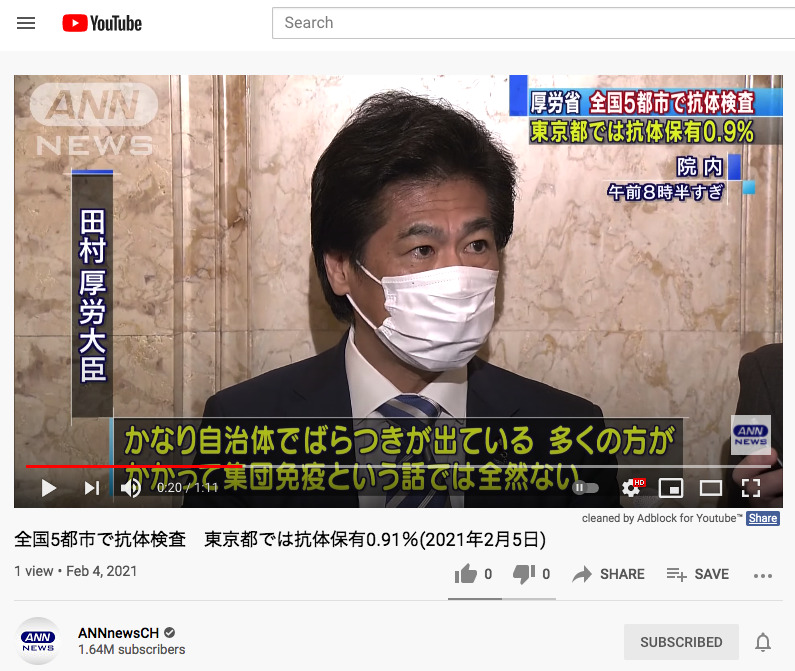Item
Antibody test in 5 cities nationwide 0.91% antibody possession in Tokyo (February 5, 2021)
Title (Dublin Core)
Antibody test in 5 cities nationwide 0.91% antibody possession in Tokyo (February 5, 2021)
全国5都市で抗体検査 東京都では抗体保有0.91%(2021年2月5日) -
Description (Dublin Core)
This news covers the antibody rate in Japan, specifically in main cities like Tokyo, Osaka, etc. Because the rate of COVID-19 increased A LOT because people are still outside not taking social distance rules, I did expect the percentage to be higher, and it was. In trains, it is packed with people, and Japan is very analog in terms of remote working. A lot of companies still do not allow remote working plus do not change the time that the employees need to clock in and thus everyone commutes around the same time. Plus, because its winter and its cold, the trains and just local restaurants cannot open windows the whole time.
Video translated by me.
The antibody test conducted by the Ministry of Health, Labor and Welfare in five cities nationwide to check the infection history of the new coronavirus found that 0.9% of people in Tokyo have the antibodies. It has increased nine times from half a year ago. Minister of Health, Labor and Welfare Tamura: "There is considerable variation in numbers among local governments. Many people are infected and there is no herd immunity." Last December, the Ministry of Health, Labor and Welfare conducted antibody tests on approximately 15,000 people in Tokyo, Osaka, Miyagi, Aichi, and Fukuoka. Using two types of tests, those who are confirmed to have the antibodies in both tests are judged as "positive". As a result, it was found that 0.91% in Tokyo, 0.58% in Osaka, 0.14% in Miyagi, 0.54% in Aichi, and 0.19% in Fukuoka had antibodies. In the survey conducted in June last year, Tokyo was 0.1%.
厚生労働省が全国の5都市で新型コロナウイルスの感染歴を調べる抗体検査をした結果、東京都では0.9%の人が抗体を持っていることが分かりました。半年前の9倍に増えています。 田村厚労大臣:「かなり自治体でばらつきが出ている。多くの方がかかって集団免疫という話では全然ない」 厚労省は去年12月、東京・大阪・宮城・愛知・福岡で約1万5000人を対象に抗体検査を実施しました。 2種類の試薬を使い、両方で陽性が確認された人を「陽性」と判定しています。 その結果、東京で0.91%、大阪で0.58%、宮城で0.14%、愛知で0.54%、福岡で0.19%の人が抗体を持っていたことが分かりました。 去年6月の調査では東京は0.1%でした。
Video translated by me.
The antibody test conducted by the Ministry of Health, Labor and Welfare in five cities nationwide to check the infection history of the new coronavirus found that 0.9% of people in Tokyo have the antibodies. It has increased nine times from half a year ago. Minister of Health, Labor and Welfare Tamura: "There is considerable variation in numbers among local governments. Many people are infected and there is no herd immunity." Last December, the Ministry of Health, Labor and Welfare conducted antibody tests on approximately 15,000 people in Tokyo, Osaka, Miyagi, Aichi, and Fukuoka. Using two types of tests, those who are confirmed to have the antibodies in both tests are judged as "positive". As a result, it was found that 0.91% in Tokyo, 0.58% in Osaka, 0.14% in Miyagi, 0.54% in Aichi, and 0.19% in Fukuoka had antibodies. In the survey conducted in June last year, Tokyo was 0.1%.
厚生労働省が全国の5都市で新型コロナウイルスの感染歴を調べる抗体検査をした結果、東京都では0.9%の人が抗体を持っていることが分かりました。半年前の9倍に増えています。 田村厚労大臣:「かなり自治体でばらつきが出ている。多くの方がかかって集団免疫という話では全然ない」 厚労省は去年12月、東京・大阪・宮城・愛知・福岡で約1万5000人を対象に抗体検査を実施しました。 2種類の試薬を使い、両方で陽性が確認された人を「陽性」と判定しています。 その結果、東京で0.91%、大阪で0.58%、宮城で0.14%、愛知で0.54%、福岡で0.19%の人が抗体を持っていたことが分かりました。 去年6月の調査では東京は0.1%でした。
Date (Dublin Core)
Creator (Dublin Core)
Contributor (Dublin Core)
Type (Dublin Core)
Screenshot, video
Link (Bibliographic Ontology)
Source (Dublin Core)
ANN News Channel
Publisher (Dublin Core)
Asia News Network
Controlled Vocabulary (Dublin Core)
English
Social Distance
English
Business & Industry
English
Transportation
English
News coverage
English
Cities & Suburbs
Contributor's Tags (a true folksonomy) (Friend of a Friend)
Linked Data (Dublin Core)
Date Submitted (Dublin Core)
2/4/2021
Date Modified (Dublin Core)
2/6/2021
02/08/2021
Date Created (Dublin Core)
2/5/2021
Item sets
This item was submitted on February 4, 2021 by Youngbin Noh using the form “Share Your Story” on the site “A Journal of the Plague Year”: http://mail.covid-19archive.org/s/archive
Click here to view the collected data.

